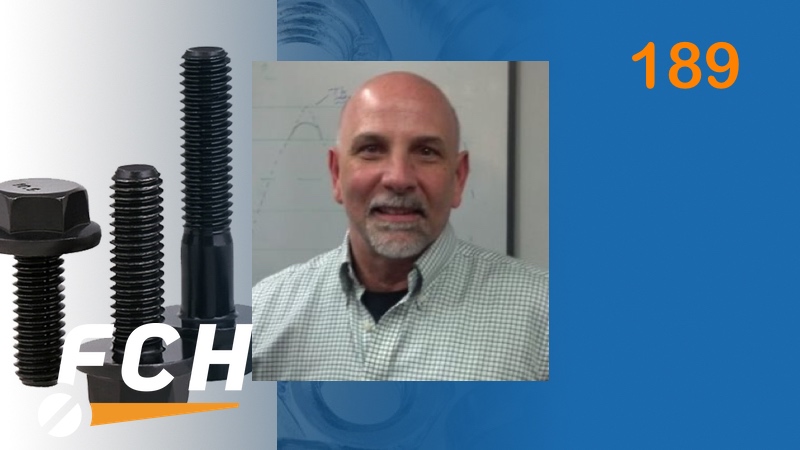This edition of the Fastener Training Minute with Carmen Vertullo was originally published June, 22nd, 2023 as “Can you recover fasteners that have hydrogen embrittlement, and should you?” during episode 189 of Fully Threaded Radio.
Well hi everybody, this is Carmen Vertullo with the Fastener Training Minute coming to you from the Fastener Training Institute and the Carver Fact Center in El Cajon California.
Today’s topic comes right out of a webinar that I’m getting ready to do with the Fastener Training Institute and it’s one of my favorite topics. The webinar topic is hydrogen embrittlement, which has lots of different faucets and segments and nuances in it, but one of those nuances that that is not often spoken about is this question which actually came to me many years ago. And I answered it and solved it and there’s not very many people that know as much about this as I do because I actually have lived it.
And the question is this: can you recover fasteners that have hydrogen embrittlement? In other words once you’ve known because of a failure or a bad test that these parts have hydrogen embrittlement and they’ve already been plated and they’ve already supposedly been baked, can we fix them?
And the answer to that question is yes, we can recover them and I know it because I’ve done it on more than one occasion. But there’s a much more important question to answer than “can we recover them” and that question is “should we recover them” When we return now answer the should we recover them question.
Welcome back everybody to the Fastener Training Minute, this is Carmen Vertullo and today we are talking about one of the nuances of dealing with hydrogen embrittlement in fasteners and that is when we have a case of hydrogen embrittlement. We have all these screws here that we know are infected with hydrogen embrittlement. Can we do anything about it? Can we recover them? Well the answer; is yes we can. And if you were on the other side of the segment you know that the more important question is: should we recover them.
It comes down to cost and risk. So first off, if it’s a small lot of fasteners and they are easily replaceable, you probably want to find out why whatever you did didn’t work, before you go and make a new lot and plate them and bake them and test them. But if there’s not a lot of money involved, then probably not. Because it does cost some money to recover them. The other side of that question is: is there significant risk in recovering them?
Well, I don’t think there is. We can know that we’ve done a good job. And then thirdly, you may have a fastener that simply is irreplaceable or at least irreplaceable in the time frame that it is needed it is not replaceable. Then these were not off the shelf fasteners; they were specially made. As a matter of fact I’m going to tell you about a case exactly like that, well, actually two cases exactly like that. Or the lot of product has very high value, In other words you got a hundred thousand dollars worth of parts you’d have to scrap if you don’t find a way to recover them.
So those are the questions basically to ask in the “should we” category. Is there significant financial incentive to recover them, number one, and secondly is there a need to recover them even if it’s not a lot of money because you can’t replace them because they’re irreplaceable, and then thirdly is the appetite for risk. And that involves the customer as well. The customer might just very well say “Hell No” and then you can’t do much about that unless they’re willing to be educated. But you can in fact do the recovery 100%. 100% safely.
So let’s explain that in the context of a recent case that I had, and actually this is a very simple case. I’m looking at these screws sitting on my desk right now as a matter of fact. They are very small, they are M3.5 flat socket cap screws. Actually I think they’re Torx Drive screws, 6-lobe and they were made to property class 12.9, for what reason I don’t know. I would just tell you right now there’s no good reason to make small socket products to a 12.9 property class. That’s way up, their hardness is above HRC 39, tensile strength is 1200 megaPascals, so we are in the hydrogen embrittlement danger zone. And then they were black zinc-plated. Theoretically they were baked, the cert says it. They were sent to me to do hydrogen embrittlement test: they did not pass.
Now we have 2000 screws that were specially made, and now they’re irreplaceable, at least in the time frame that we had to replace them. So I said, “would you like to try to recover it?” at a conversation with the distributor. We talked to the end user, and they said” “let’s give it a shot”. So essentially what we did was we simply rebaked these screws, just as they were. This is the simplest option. We have an oven in here, put them in the oven at 400 Degrees. We gave them 30 hours at 400 degrees. We retested them, and they were fine. So we recovered that lot. Now the down side of that is that you could possibly damage the zinc plating. Actually it’s not the zinc you’re going to damage, it’s whatever the top coat is, which is probably some kind of trivalent, hexavalent, chromate or something else. It turns out that those coatings can withstand that temperature but they dry out. So once they rehydrate, that is they’re in the atmosphere, they’re fine.
If you wanted to take it one step further, you could do a simple corrosion test. You could take a few before re-baked screws, and a few after re-baked screws, and set them out in the weather for a little bit. Or if you happen to have a salt spray chamber, or you could mickey up some kind of a corrosive environment. And my experience is that we can do that. So that’s the simplest method. It didn’t cost a lot of money. You have another test you have to do; you have the baking. And we recovered that lot very nicely.
Now I’m going to tell you about a more complicated case that happened several years ago. In that case it wasn’t that the screws were irreplaceable, but there was a large number of them: container loads of M5, M6 and M8 Hex Washer Head machine screws with a hardened shaped washer. I’ll just call it a conical washer for lack of a better word, and these washers had hydrogen embrittlement. The screws themselves were not H-E susceptible, it was the washers because they were hardened. So when the parts were plated, theoretically they were baked. This was all done in an overseas location very large country. I won’t tell you which one. And we went over there and investigated the problem. It turned out that the plater did not possibly have enough capacity to bake all these screws based on the time in which they were plated, looking at their ovens. Even though it was a pretty large operation, we were very able to definitively figure out there was no way all of the screws were baked. There was also no way to know which ones were baked and which ones were not baked We were able to do some lot testing, and based on that keep some lots. But we still had a very large number of screws that had to be adjusted.
In this case, what we ended up doing, was stripping the screws, baking the screws, testing the screws, replating them, baking them, and retesting them. And we recovered quite a few tens of maybe hundreds of thousands of dollars worth of product this way. And that was the process that the end-user wanted us to go through to agree to being able to do this recovery. And we also had to have a plater who was willing to do this. You can’t do this at just any plater; this really had to be done at one of the larger automotive platers that have belt processes for baking and so on. And it took us about a month to do it. So it wasn’t an immediate turn around as the smaller screw was, but it was doable. We recovered the product and everybody was happy afterwards.
So it’s a hard lesson to learn, to fall into the hydrogen embrittlement trap, however you may fall into it. But I believe that asking the question: can we recover hydrogen embrittlement screws?, is a good one to ask. The answer is yes, but then of course the next question is should we?
And there’s a very simple flow chart (if you wanted to call it that) of questions we can ask to decide whether or not that would be a good decision. In many cases it is a good decision, and I want you to know if you have to make that decision, I can help you make it. There’s no charge for that kind of help; it’s a quick conversation, and we can get you down the road. If you have that kind of a problem, and even if you want me to be involved in the actual recovery process, I can do that as well. Either personally, or by helping to find you the supplier who can do it for you.
Well now you know something hopefully that will help you in the future if you run across a situation with hydrogen embrittlement and you don’t want to throw those fasteners away.
This has been Carmen Vertullo with the Fastener Training Minute, thanks for listening.





